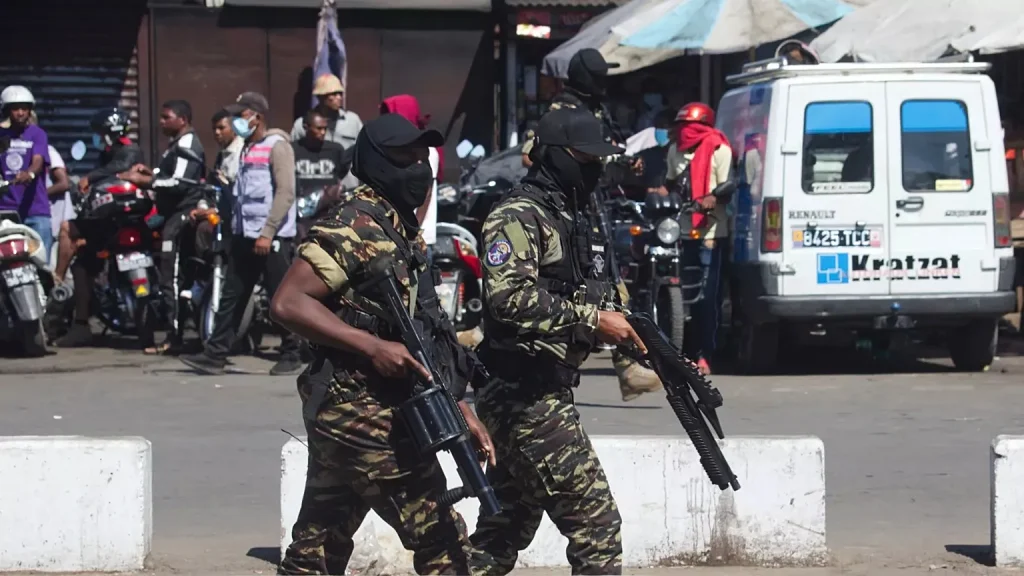Madagascar’s military has seized control of the country after weeks of youth-led unrest, forcing President Andry Rajoelina to flee abroad amid a deepening political crisis on the Indian Ocean island.
Colonel Michael Randrianirina, commander of the elite Capsat military unit, appeared on national television on Monday to announce that the army had taken power and would oversee a two-year transition leading to a new constitution and elections.
“The renovation period will last a maximum of two years,” Col Randrianirina said. “During this time, a referendum will be held to establish a new constitution, followed by elections to gradually set up new institutions.”
The colonel declared that the senate, constitutional court, electoral body, and other key institutions had been suspended “until further notice.”
President flees as coup unfolds
The move came shortly after Madagascar’s parliament voted to impeach President Rajoelina, who reportedly flew to safety on a French military aircraft after striking a deal with Emmanuel Macron, France’s president.
Mr Rajoelina, 51, condemned the takeover as an “attempted coup d’état,” insisting he remained the country’s legitimate leader.
“The presence of armed military forces in front of the presidential palace constitutes a clear act of attempted coup,” a statement from the presidency said. “The president of the republic remains fully in office and ensures the maintenance of constitutional order and national stability.”
However, his whereabouts were unknown on Tuesday, with sources in Antananarivo suggesting he had “moved to a safe location” following threats to his life.
Madagascar has been plagued by political instability since gaining independence from France in 1960.
Ironically, Mr Rajoelina himself came to power through a military-backed coup in 2009, aided by the same Capsat unit that has now deposed him.
The island nation has endured frequent political crises and repeated suspensions from the African Union. Analysts say the latest power grab reflects both the army’s enduring political influence and widespread disillusionment with civilian leadership.
‘Gen Z’ anger boils over
The coup followed weeks of massive “Gen Z protests” led largely by young people angry over electricity blackouts, water shortages, and government corruption.
Clashes between demonstrators and security forces left at least 22 people dead and dozens injured, according to local human rights monitors.
The protests, which began as local grievances over failing public services, soon evolved into a broader movement against elite misrule — mirroring similar youth-driven uprisings in Morocco, Indonesia, Nepal, and Kenya.
Over the weekend, Col Randrianirina’s unit defected to the protesters’ side, surrounding government buildings in the capital before taking control of the national broadcaster and presidential palace.
Court invites colonel to take charge
Madagascar’s High Constitutional Court has since invited Col Randrianirina to serve as interim president, formalising the military’s control. He pledged to restore “stability and unity” but has not said whether the army intends to allow Rajoelina or his allies to contest future elections.
It was not immediately clear whether protesters — many of whom had demanded full democratic change, would accept the new military-led transition.
Read Also: Zimbabwe president removes army chief amid coup rumours
A continent-wide pattern
Madagascar becomes the sixth African nation to fall to military rule since 2020, following Mali, Guinea, Burkina Faso, Niger, and Gabon.
The succession of coups has prompted alarm across the continent and within Western capitals, raising fears of a democratic rollback after two decades of fragile progress.
Observers say the continent’s wave of coups reflects mounting frustration with weak governance, poverty, and insecurity — conditions exacerbated by inflation and global economic shocks.
“The rise of these coups tells us that African democracies are losing legitimacy among their citizens,” said Dr. Aïssata Kane, a political analyst in Dakar. “People are demanding change — but too often, they are getting soldiers instead.”
While calm returned to parts of Antananarivo on Tuesday, tension remained high around the presidential complex and government buildings.
International organisations including the African Union, United Nations, and European Union condemned the takeover and called for restraint.
France’s foreign ministry said it was “closely monitoring developments” and urged the Malagasy military to respect “democratic order and constitutional processes.”
For now, the fate of Andry Rajoelina — the president-turned-exile — remains unclear. But for Madagascar’s 30 million citizens, weary of power cuts and political crises, the army’s promise of a “new beginning” will be met with both hope and deep skepticism.



